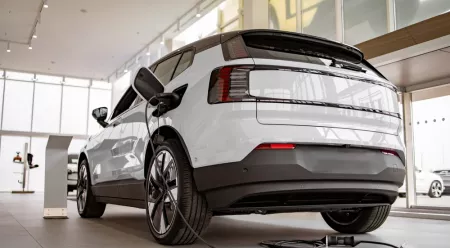Whether you've been driving for over 20 years or earned your driver's licence a few weeks ago, there's always a chance that you'll get into a car accident.
Countless accidents take place in Canada each year; these accidents result in millions of dollars' worth of damage to vehicles (along with other forms of private and public property).
If you get into a car accident, like a rear end collision, one of the first things that you ask yourself is, "will this affect my car insurance premium?". Unfortunately, there's no cut-and-dry answer to this question — the answer depends on a number of variables, including which party has been deemed "at fault" for the event.
This brings us to today's question — who is at fault in a rear end collision?
START A QUOTE
Continue reading to learn more!
What does "at fault" mean?
As the name implies, at fault is a term that indicates which party (or parties) are responsible for a collision. If you get into a car accident with another driver, you will both be given a fault rating between 0% and 100%. This score determines how responsible you are for the accident.
For example, if you are given a score of 100%, that means that you are entirely responsible for the accident. On the other hand, if you receive a score of 40% and the other driver gets a score of 60%, you are partially responsible for the accident.
How do car insurance companies determine fault in Canada?
Car insurance companies take a wide array of factors into consideration while determining who's at fault for an accident. Some examples of these factors include:
- The number of drivers involved in the accident
- The speed of the driver or drivers (not in Ontario or the Maritimes)
- Road and weather conditions during the accident
- The location of the accident
Additionally, car insurance companies need to reference the Fault Determination Rules while determining who is at fault for a rear end accident (or any other type of accident, for that matter).
The Fault Determination Rules provide insurers with invaluable information and diagrams that can help them allocate fault for over 40 different types of accidents, including rear ended accidents. Insurance companies allocate fault by comparing the event to the diagram that most accurately resembles the situation.
*Please note that Fault Determination Rules vary from province to province).*
Who is at fault in a rear end collision in Canada?
Rear ended collisions are relatively common in Canada, especially in major cities with heavy traffic. This would lead you to believe that insurance companies have the fault determination process down to a science; and in this case, you're right!
If you’re wondering, “who is at fault in a rear end collision?”, you’ll be pleasantly surprised that it’s a relatively straightforward process.
In most cases, the driver who initiates contact is generally deemed responsible for the situation. This applies to vehicles on the road and on the side of the road.
In other words, if you get into a rear ended accident with the vehicle in front of you, you will most likely be deemed at fault for the accident. On the other hand, if the driver behind you accidentally rear ends your vehicle, they will most likely be deemed at fault.
If you get rear-ended and that collision pushes you into the car in front of you, and you rear-end them, you will be held responsible for hitting the person ahead of you, even if you were at a complete stop. In multi-car accidents, the only person who will be 0% at fault will be the person at the very front of the line.
If you pull out in front of someone and they rear-end you, but they also hit a portion of the side of your car, then you will be at-fault. A true "rear-end" means they hit you totally from the rear. Side impact indicates that you pulled out in front of them and are at fault.
Do at fault rear end collisions influence car insurance premiums in Canada?
In most cases, yes, your car insurance company will most likely increase your car insurance premium if you're deemed at fault for a car accident (rear ended or otherwise).
However, there are a handful of ways that you can avoid paying more for insurance if you get into an accident.
For instance, if you have a clean driving record, you may be able to protect your low car insurance premium by adding accident forgiveness to your car insurance policy. Accident forgiveness is an optional form of coverage that prevents car insurance companies from increasing your rates after your first at fault accident.
Additionally, in certain provinces, like Ontario, car insurance companies are not allowed to increase your car insurance premium if you're involved in a minor at fault accident. A minor at fault car accident is a collision that meets the following criteria:
- Result in less than $2,000 worth of vehicle/property damage (for all parties involved)
- Any damages paid by the at fault person
- There are no rear end collision injuries
- Neither party's insurance providers have made payments
*This rule applies to one minor car accident every three years.*
Although a minor at-fault accident will not increase your premium with that company, it may affect your eligibility to remain with that insurance carrier. If you had another accident in the past 6 years, the insurance company may decline to offer you a renewal.
Are you thinking about updating your car insurance policy? The first thing that you should do is reach out to your Surex insurance advisor!
Save up to 25% on car insurance when you bundle multiple policies with Surex
If you've ever shopped around for automobile insurance, then you know that finding the right policy can be a time-consuming task. In the past, policyholders needed to contact individual agents in order to compare car insurance quotes. Nowadays, modern drivers can save time and money by shopping for car insurance with an online insurance brokerage like Surex.
Our team of advisors works with several of the top-rated car insurance companies in Canada. Working with a wide range of companies gives our advisors the ability to provide you with a variety of personalized quotes at once.
Want to get started? Contact one of our advisors today! We can help you compare competitive insurance quotes in ten minutes or less!
While you're chatting with your Surex insurance advisor, feel free to ask about the various benefits of bundling multiple policies with one of our esteemed insurance partners. You can get access to incredible savings (sometimes as high as 25%!).
FAQ
Here are some commonly asked questions about rear end collisions and fault determination:
I rear ended someone who stopped suddenly — who is at fault?
As mentioned earlier, the driver that initiates contact with the other vehicle is generally at fault. This rule applies even if a vehicle stops in front of you.
Who is at fault in a multiple rear end collision in Canada?
It can be tricky to determine fault in multi-car accidents, but, in many cases, each driver that initiates contact with the vehicle in front of them is partially responsible for the event.



